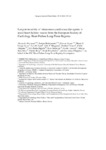Long‐term safety of intravenous cardiovascular agents in acute heart failure: results from the European Society of Cardiology Heart Failure Long‐Term Registry

Ver/
Use este enlace para citar
http://hdl.handle.net/2183/20651Coleccións
- Investigación (FEP) [504]
Metadatos
Mostrar o rexistro completo do ítemTítulo
Long‐term safety of intravenous cardiovascular agents in acute heart failure: results from the European Society of Cardiology Heart Failure Long‐Term RegistryAutor(es)
Data
2017-10-08Cita bibliográfica
Mebazaa A, Motiejunaite J, Gayat E, Crespo-Leiro MG, Lund LH, Maggioni AP, et al. Long‐term safety of intravenous cardiovascular agents in acute heart failure: results from the European Society of Cardiology Heart Failure Long‐Term Registry. Eur J Heart Fail. 2018;20(2):332-341
Resumo
[Abstract] Aims. The aim of this study was to assess long‐term safety of intravenous cardiovascular agents—vasodilators, inotropes and/or vasopressors—in acute heart failure (AHF).
Methods and results. The European Society of Cardiology Heart Failure Long‐Term (ESC‐HF‐LT) registry was a prospective, observational registry conducted in 21 countries. Patients with unscheduled hospitalizations for AHF (n = 6926) were included: 1304 (18.8%) patients received a combination of intravenous (i.v.) vasodilators and diuretics, 833 (12%) patients received i.v. inotropes and/or vasopressors. Primary endpoint was long‐term all‐cause mortality. Main secondary endpoints were in‐hospital and post‐discharge mortality. Adjusted hazard ratio (HR) showed no association between the use of i.v. vasodilator and diuretic and long‐term mortality [HR 0.784, 95% confidence interval (CI) 0.596–1.032] nor in‐hospital mortality (HR 1.049, 95% CI 0.592–1.857) in the matched cohort (n = 976 paired patients). By contrast, adjusted HR demonstrated a detrimental association between the use of i.v. inotrope and/or vasopressor and long‐term all‐cause mortality (HR 1.434, 95% CI 1.128–1.823), as well as in‐hospital mortality (HR 1.873, 95% CI 1.151–3.048) in the matched cohort (n = 606 paired patients). No association was found between the use of i.v. inotropes and/or vasopressors and long‐term mortality in patients discharged alive (HR 1.078, 95% CI 0.769–1.512). A detrimental association with inotropes and/or vasopressors was seen in all geographic regions and, among catecholamines, dopamine was associated with the highest risk of death (HR 1.628, 95% CI 1.031–2.572 vs. no inotropes).
Conclusions. Vasodilators did not demonstrate any association with long‐term clinical outcomes, while inotropes and/or vasopressors were associated with increased risk of all‐cause death, mostly related to excess of in‐hospital mortality in AHF.
Palabras chave
Acute heart failure
Inotrope
Vasopressor
Vasodilator
Prognosis
Long-term outcome
Inotrope
Vasopressor
Vasodilator
Prognosis
Long-term outcome
Versión do editor
Dereitos
This is the peer reviewed version of the article which has been published in final form at Wiley Online Library. This article may be used for non-commercial purposes in accordance with Wiley Terms and Conditions for self-archiving.
ISSN
1388-9842





